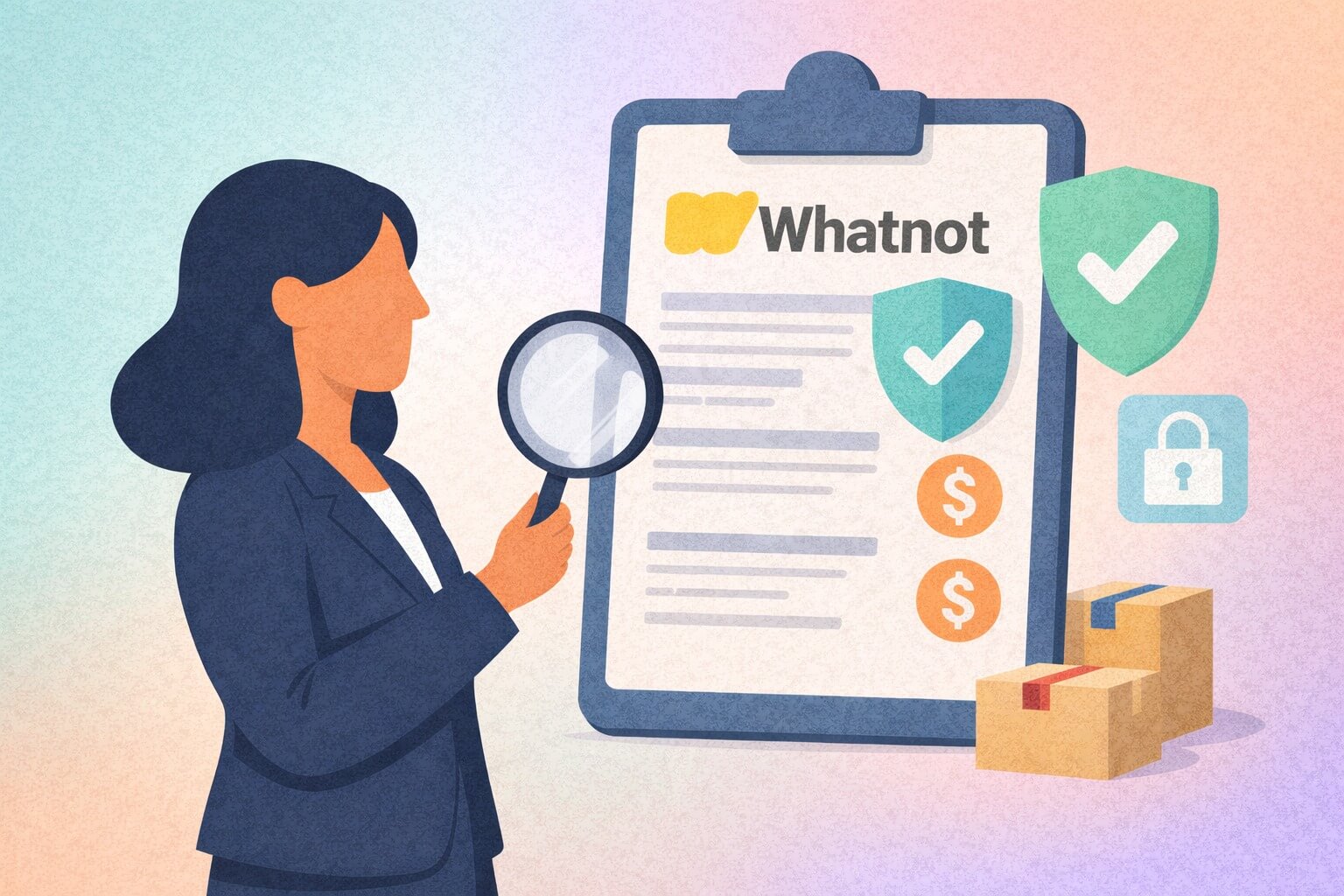10 best Mercari alternatives in 2026: The complete list

The best Mercari alternatives in 2026 include eBay as the best overall, Poshmark for fashion enthusiasts, and Depop for vintage styles.
These alternatives solve Mercari's limitations by offering better transaction fees for sellers, international sales, and no waterfall pricing.
In this guide, we'll explore the top 10 Mercari alternatives, their advantages over Mercari, and their target audiences. We’ll also introduce Nifty, a reselling tool that lets you manage listings from Mercari and other marketplaces from a single interface.
The 10 best Mercari alternatives: At a glance
1. eBay: Best overall Mercari alternative

eBay offers resellers a marketplace with global reach and advanced seller tools. It’s perfect for volume sellers managing diverse inventory, businesses wanting international customers, or sellers who prefer both auction-style sales and fixed-price listings.
Advantages over Mercari
- Better AI tools: eBay's AI-powered listing tools automatically suggest titles, categories, and item specifics based on your photos and descriptions. Users claim that the tool saves them time when creating listings.
- Global reach: eBay connects you to potential sales in over 190 countries, whereas Mercari restricts you to domestic sales only. A buyer in Tokyo or London might pay more for your product than someone browsing Mercari’s limited U.S. market.
- Larger pool of buyers: With over 180 million active buyers worldwide compared to Mercari's smaller U.S.-focused user base, eBay gives your listings significantly more visibility.
Ideal users
eBay is a Mercari alternative that works best for established resellers and businesses managing large inventory volumes. Antique dealers, electronics refurbishers, automotive parts suppliers, and collectibles sellers benefit from global reach and advanced tools.
Businesses offering rare or one-of-a-kind items gain more value through auctions and international buyers.
Fees
eBay charges final value fees ranging from 10% to 15% depending on your category and seller level. The marketplace charges a $0.35 listing fee for each item after the first 250.
The bottom line
eBay gives sellers more control and visibility than Mercari. But, many casual or first-time sellers avoid eBay because of the fees and complexity.
2. Poshmark: Best fashion-focused Mercari alternative

Poshmark specializes in fashion resale with built-in social features like sharing and live streaming that help sellers build audiences and drive repeat sales.
Advantages over Mercari
- Social selling features with built-in marketing: Poshmark’s sharing, following, Live Shows, and Posh Parties help sellers reach new buyers. You can share listings to themed parties, follow other sellers for reciprocal promotion, and build a loyal customer base through social engagement.
- Fashion-focused buyer base seeking branded items: Unlike Mercari's general marketplace, Poshmark attracts buyers specifically hunting for clothing, shoes, and accessories.
- Simplified flat-rate shipping system: Poshmark's $8.27 prepaid shipping protects you from shipping cost miscalculations. You receive USPS Priority Mail boxes by default, along with professional-looking packaging and tracking included.
Ideal users
Poshmark works best for fashion resellers, clothing boutiques, and individual sellers focusing on branded apparel and accessories. Sellers who enjoy social interaction and want to build personal brands will also benefit from Poshmark.
Fees
Poshmark charges no listing fees but takes a $2.95 flat fee on sales under $15 and 20% commission on sales over $15. Buyers pay a flat $8.27 shipping rate.
The bottom line
Poshmark provides fashion sellers with a style-focused audience and engaging social features that support brand building. However, its 20% commission reduces profits on high-ticket items.
3. Depop: Best vintage-focused Mercari alternative
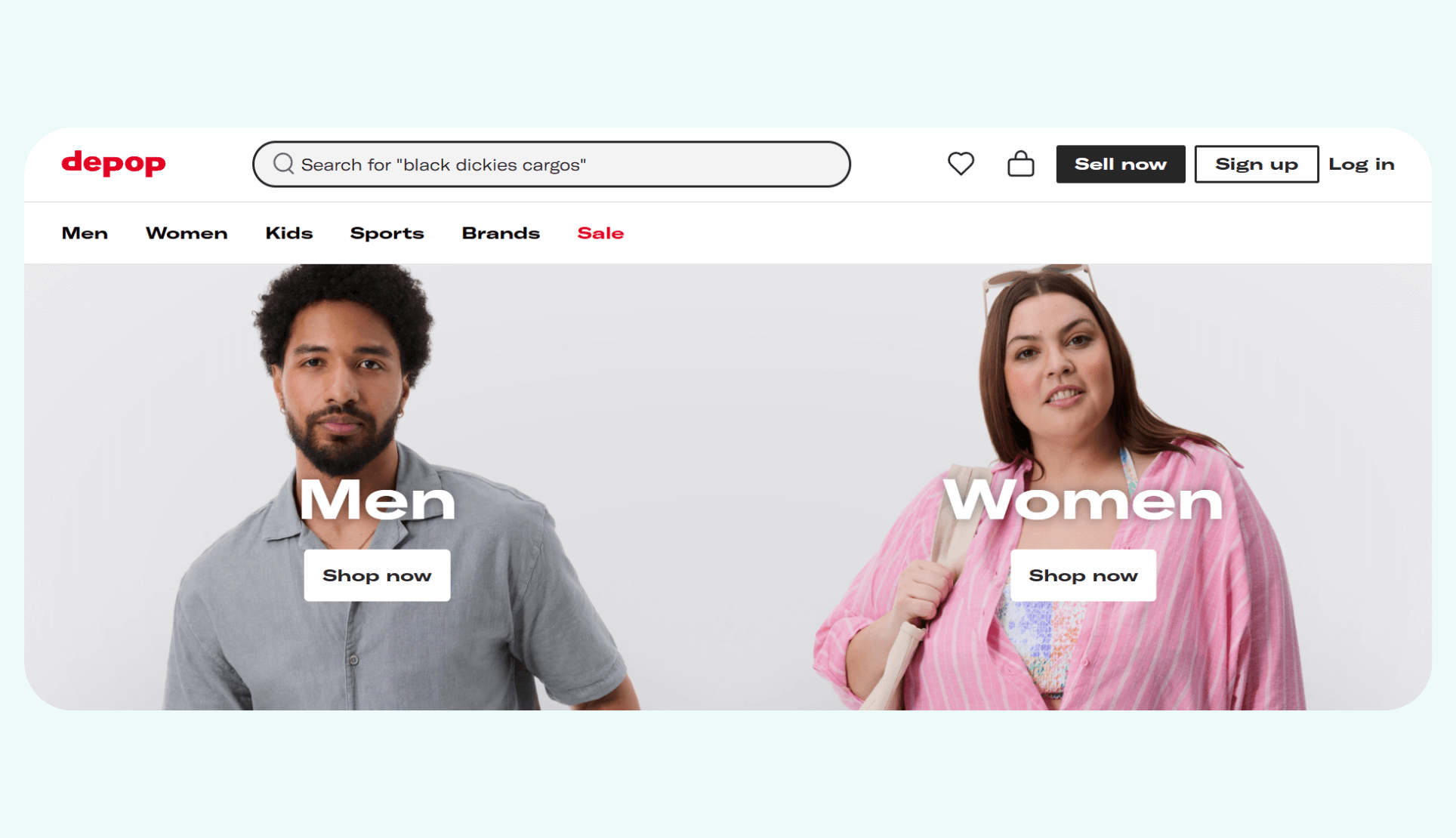
Depop supports vintage sellers and trendy boutiques. Use it to sell Y2K fashion internationally or create a curated vintage shop with a visual, scroll-friendly layout.
Advantages over Mercari
- Social-media style discovery and branding: Depop's feed-based interface lets buyers discover items through scrolling, following sellers, and engaging with posts. Its layout helps buyers discover items Mercari hides, and sellers have said that they use the layout so their products can stand out.
- Global marketplace with international shipping: Depop connects you to buyers worldwide, while Mercari restricts sales to domestic customers only.
- Trend-focused buyer demographic: Depop's Gen Z and younger Millennial user base actively seeks vintage, Y2K, alternative fashion, and one-of-a-kind pieces that stand out from mass-market offerings.
Ideal users
Depop excels for creative entrepreneurs, vintage curators, and fashion-forward sellers targeting Gen Z and young Millennial buyers. Small-scale businesses and individual sellers specializing in Y2K fashion, streetwear, handmade accessories, and unique thrifted finds will find Depop useful.
Fees
Depop charges no platform fees for U.S. sellers, with only payment processing costs of 3.3% + $0.45 per transaction. International sellers, outside the U.S. and U.K., pay a 10% seller fee plus extra processing charges.
The bottom line
Depop's zero seller fees and aesthetic-focused platform make it perfect for creative sellers targeting younger buyers and vintage enthusiasts. Resellers targeting non-fashion categories or older buyers seeking branded items may find Depop too casual and limited in its reach.
4. Facebook Marketplace: Best for local sales
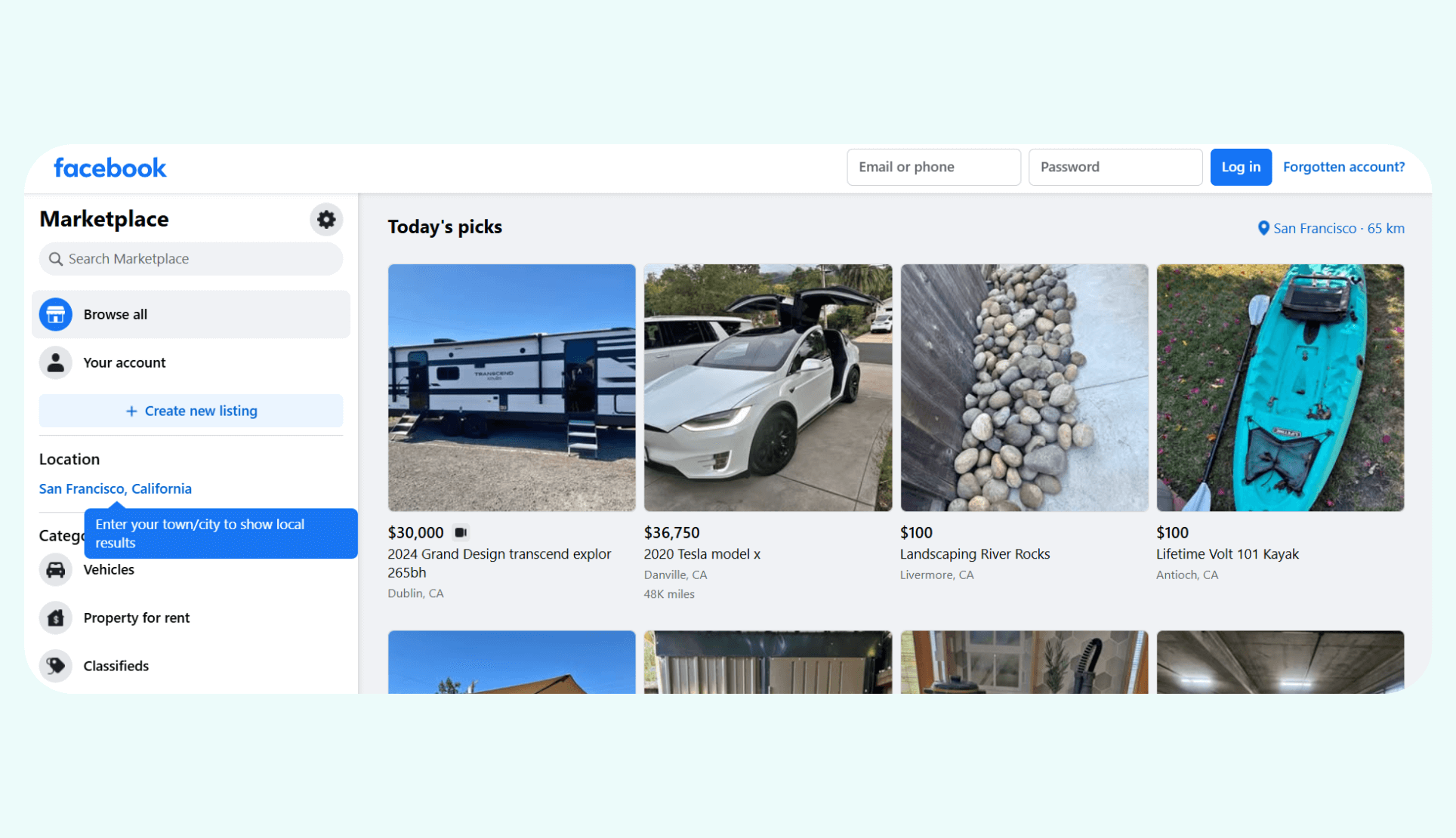
Facebook Marketplace integrates the world's largest social network to connect local buyers and sellers, eliminating shipping costs and delivery delays through face-to-face transactions.
Advantages over Mercari
- Hyperlocal targeting: Facebook Marketplace connects you directly with buyers in your immediate area. This local focus works particularly well for heavy items like furniture, exercise equipment, and appliances that would be expensive to ship.
- Built-in social verification and buyer screening: Unlike websites like Mercari that keep users anonymous, Facebook Marketplace displays real profiles and account history, making it easier to spot and avoid scams.
- Pre-packaged audience: With over 1 billion monthly active users already browsing Facebook daily, items show up in local feeds and personalized suggestions. Users have praised the platform because they can post a listing on Facebook Marketplace and easily share it across Facebook Groups to maximize exposure.
Ideal users
Facebook Marketplace excels for local sellers, furniture flippers, and anyone dealing with bulky items that are expensive to ship. Individual sellers and small-scale businesses benefit most from the free local model.
Fees
Facebook Marketplace charges no fees for local pickup transactions between individual users. However, sellers using Facebook's shipping options pay 5% selling fees plus payment processing costs of 2.9% + $0.30 per transaction.
The bottom line
Facebook Marketplace's free local sales model and large user base make it perfect for selling bulky items and getting quick cash. However, sellers of small, shippable items will find Facebook's local-only focus limiting compared to Mercari's structured shipping system.
5. Whatnot: Best for live auctions

Whatnot is a Mercari competitor that lets resellers host live-streaming auctions. It serves collectors, resellers, and enthusiasts who want to build communities around their products rather than simply listing items.
Advantages over Mercari
- Live auction format: Unlike Mercari's fixed-price listings, Whatnot's real-time auctions generate excitement and urgency that can drive selling prices well above market value.
- Community building: Whatnot allows sellers to create revenue streams from dedicated audiences who return for regular shows. Successful streamers build loyal followings who show up to support them, driving consistent sales and higher customer value than one-off Mercari purchases.
- Gamification through mystery boxes and interactive experiences: Whatnot's format supports mystery pack openings, grab bags, and interactive games that attract buyers seeking excitement as well as merchandise.
Ideal users
Whatnot excels for niche resellers, vintage collectible dealers, and trading card specialists who enjoy live interaction and community building. The platform is ideal for sellers who are comfortable with live-streaming, regular scheduling, and building personal brands.
Fees
Whatnot charges an 8% seller fee (in the U.S., Canada, and Australia) plus a 2.9% + $0.30 payment processing fee on successful auction sales.
The bottom line
Whatnot's live auction format can generate significantly higher prices through competitive bidding and community engagement. But for introverted sellers or anyone listing everyday items, live-streaming can feel draining.
6. Etsy: Best for artisans and handmade goods

Etsy leads the handmade and vintage marketplace with over 96 million active buyers seeking unique, creative products that mass retailers can't provide.
Advantages over Mercari
- International marketplace reach with localized currency support: Etsy handles currency conversion, international shipping calculations, and localized payment methods across 150+ countries.
- Vintage and handmade category expertise: Etsy buyers actively seek vintage goods (20+ years old) and truly handmade items. This marketplace attracts a knowledgeable crowd willing to pay more for quality and authenticity.
- Advanced analytics: Etsy gives sellers shop stats, keyword insights, and buyer demographics to fine-tune listings and understand their market.
Ideal users
This platform serves artisans, vintage collectors, and craft suppliers aiming to build sustainable creative businesses rather than casual resellers. You can launch a custom jewelry line with international shipping capabilities and sell vintage home decor to buyers specifically searching for authentic mid-century pieces.
Fees
Etsy charges a $0.20 per listing fee, renewed every 4 months or upon sale, 6.5% transaction fees on the total sale amount, including shipping, and 3% + $0.25 payment processing fees for U.S. sellers.
International sellers face an additional 2.5% currency conversion fees. Offsite Ads are mandatory for sellers earning $10,000+ annually, charging 12–15% commission on external traffic sales. Total fees typically range from ~20–25% of the sale price, making Etsy one of the more expensive platforms.
The bottom line
Etsy's specialized handmade and vintage focus attracts buyers worldwide willing to pay premium prices for authentic, unique products. But complex fee structures and strict authenticity requirements can overwhelm casual sellers or those with mass-produced items.
7. GOAT: Best for footwear sellers

GOAT targets sneaker sellers focused on collectors and resellers, where trust and authenticity matter more than convenience.
Advantages over Mercari
- Specialized sneaker audience: Unlike Mercari's general bargain-hunting user base, GOAT attracts serious sneaker collectors and enthusiasts willing to pay market premiums for authenticated, rare, or limited-edition footwear.
- Professional authentication and condition grading system: GOAT verifies each sneaker's authenticity, condition, and quality through a combination of AI and expert inspection before shipping to buyers, reducing the counterfeit risk common on peer-to-peer platforms like Mercari. As a result, many buyers praise the platform.
- Consignment program for high-value items: GOAT operates as a consignment service, meaning GOAT purchases your items and pays you when your items sell. It handles the entire selling process, from professional photography to authentication and shipping.
Ideal users
GOAT excels for serious sneaker resellers, streetwear collectors, and footwear enthusiasts building businesses. Sellers who are comfortable with premium markets and patient enough for authentication processes will find GOAT useful.
Fees
GOAT charges a 9.5% fee for sellers with a rating of 90 or above, but you’ll incur higher fees if your rating dips below 90:
- Seller rating 70–89: 15% commission
- Seller rating 50–69: 20% commission
- Seller rating under 50: 25% commission
Sellers receive payouts after authentication and confirmation of delivery. The marketplace also charges a location‑based seller fee of ~$5–$30.
The bottom line
GOAT's authentication and sneaker-focused audience support higher pricing than general marketplaces, but its narrow focus on footwear and streetwear excludes most other sellers.
8. StockX: Best for investors
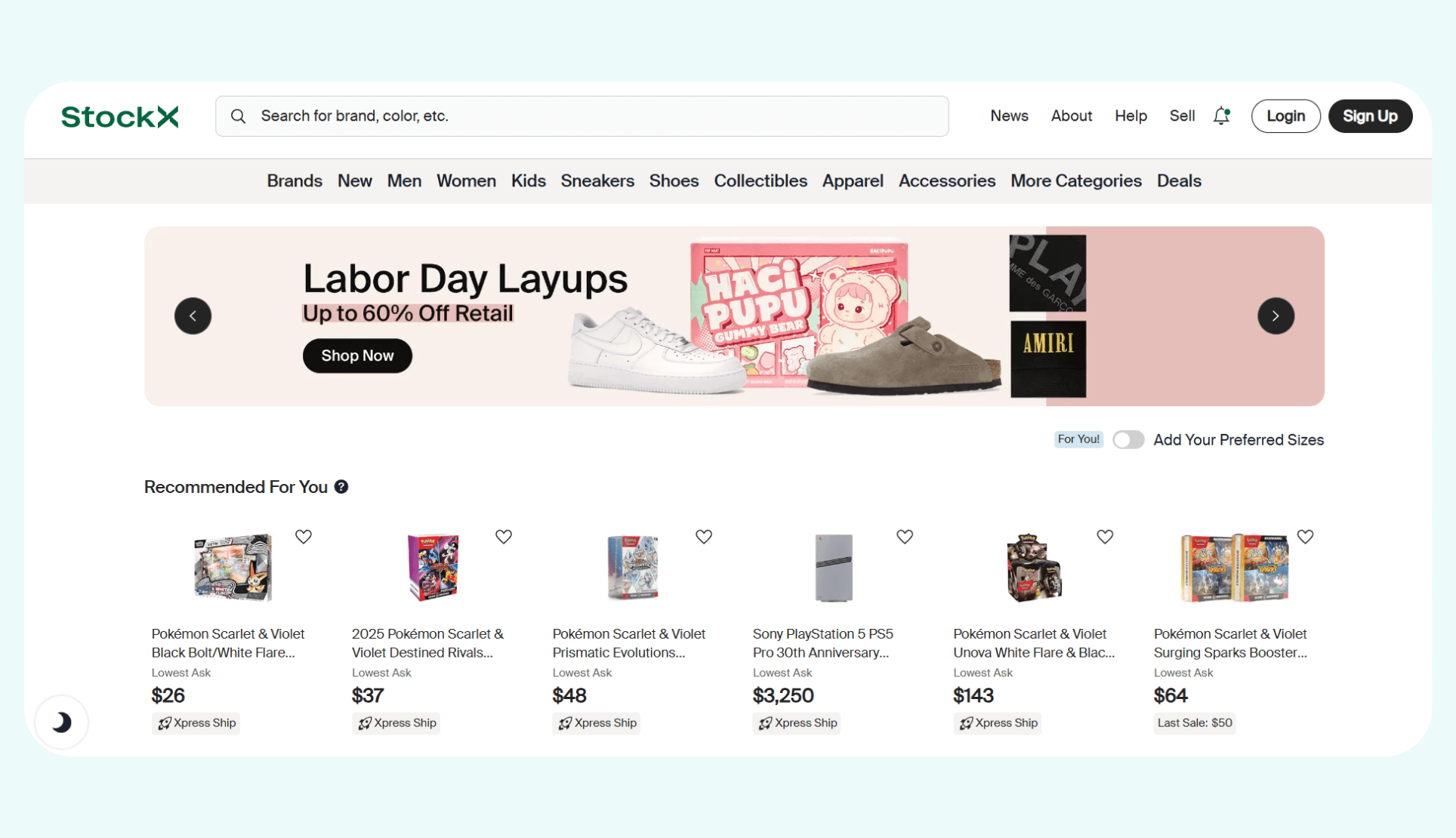
StockX operates like a stock market for high-end goods, using real-time bids and verified authentication to trade sneakers, streetwear, electronics, and collectibles.
Advantages over Mercari
- The stock market's bid/ask system: Unlike Mercari’s fixed-price listings, StockX runs on live bidding, where buyers place bids and sellers set asks. The real-time model creates competition that pushes prices higher.
- Real-time market analytics and investment tracking tools: The platform provides live price charts, historical sales data, volatility indicators, and portfolio tracking features.
- Anonymous trading system: StockX aims to reduce disputes by eliminating direct buyer-seller interaction, handling all communication, shipping, and transaction management.
Ideal users
StockX appeals to luxury collectors and resellers who treat sneakers and streetwear as investment assets. Medium-scale businesses and serious collectors focusing on authenticated luxury items benefit most from StockX's investment-grade platform.
Fees
StockX charges 7–9% seller fees on successful transactions, with rates varying by product category and seller level. StockX includes authentication costs in its commission.
The bottom line
StockX's stock market approach and authentication services enable premium pricing for luxury goods. However, general resellers with diverse, everyday inventory or casual sellers lacking expertise in luxury markets will find StockX unnecessarily complex and restrictive.
9. Grailed: Best Mercari alternative for men
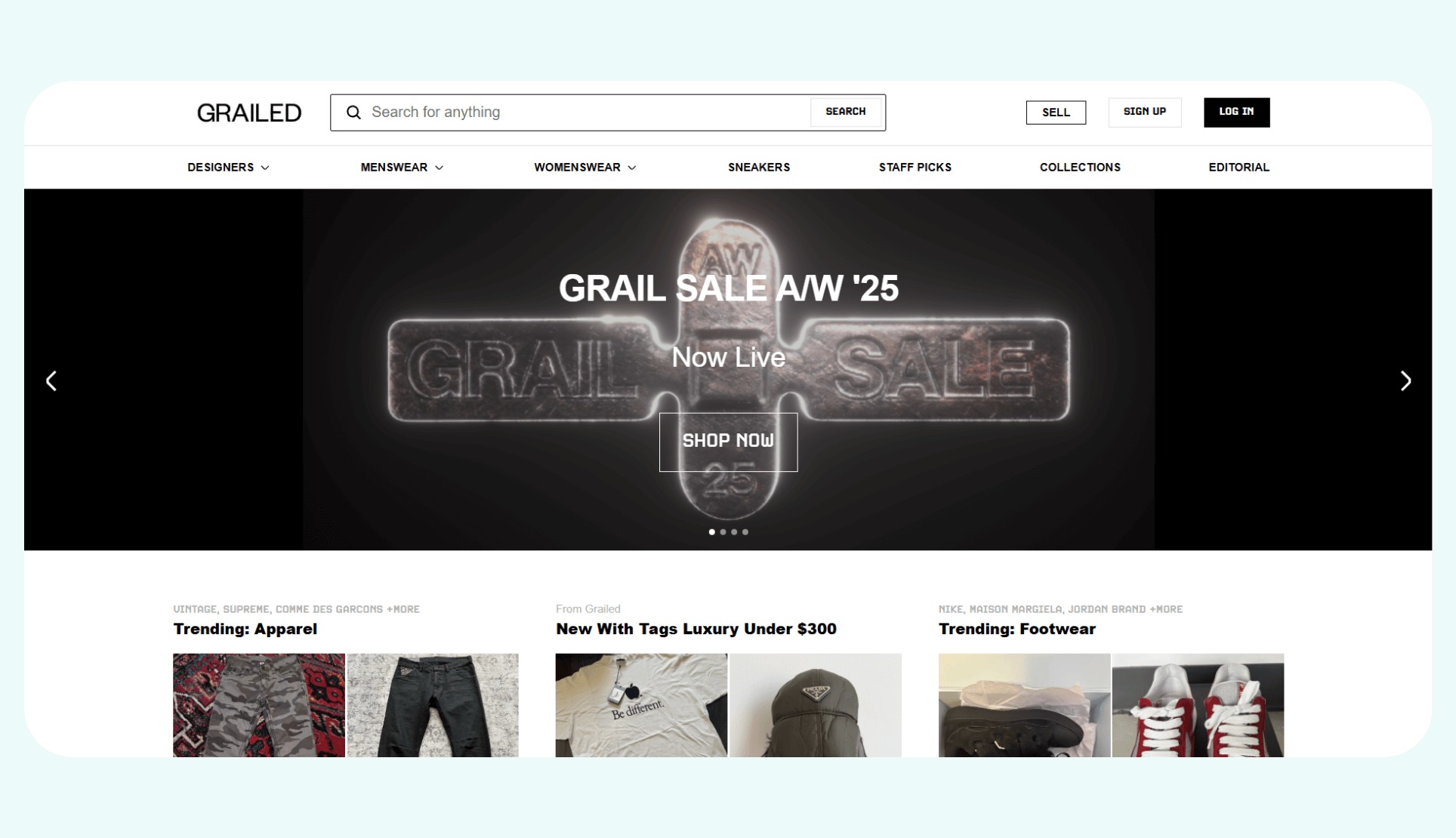
Grailed specializes in men's fashion resale, focusing on designer streetwear, vintage pieces, and luxury items aimed at buyers seeking high-end fashion.
Advantages over Mercari
- Filtering and search capabilities: Grailed's advanced filtering system allows buyers to search by specific designers, seasonal collections, garment measurements, and condition grades that fashion enthusiasts use.
- Designer authentication and condition grading for luxury items: The platform provides authentication services and condition evaluations of high-end items.
- Social features and community engagement: Grailed incorporates social elements like user profiles, follower systems, and community discussions.
Ideal users
Grailed men seeking streetwear, luxury, and vintage clothing. Independent fashion resellers focused on high-end menswear, limited streetwear drops, and archival designer pieces succeed on Grailed.
Fees
Grailed charges a flat 9% seller fee, plus a 3.49% + $0.49 on U.S. sales and a 4.99% + $0.49 payment processing for international sales.
The bottom line
Grailed's fashion-focused community and sophisticated filtering enable premium pricing for designer menswear. General resellers, women’s clothing sellers, and casual flippers struggle on Grailed due to its narrow menswear focus and style-driven buyer base.
10. Curtsy: Best for women’s fashion
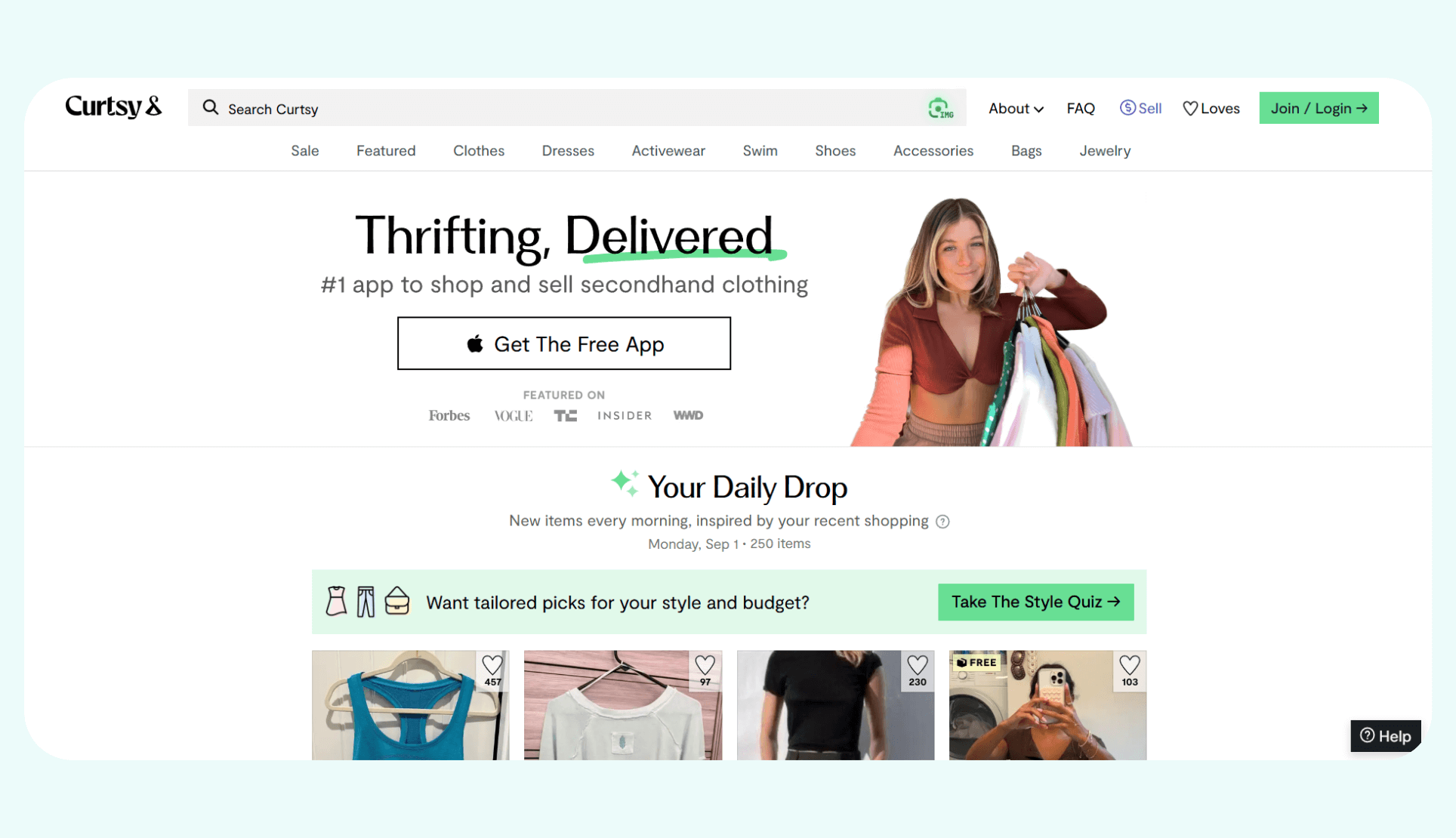
Curtsy specializes in secondhand women’s clothing and accessories. It highlights trendy Gen Z fashion, streamlined listings, and fast payouts, making it a good choice for resellers who prefer a simple, uncluttered selling experience.
Advantages over Mercari
- Fashion-focused buyer base: Curtsy attracts young women seeking clothing, shoes, and accessories instead of general household items. These buyers follow trends, so on-trend pieces sell faster than on Mercari’s bargain-focused marketplace.
- Social discovery features for better visibility: Outfit inspiration, style feeds, and sharing help buyers find items. Unlike Mercari’s search model, Curtsy’s Instagram-style browsing boosts exposure for well-photographed items.
- Quality customer service: Sellers who face issues get quick help from the support team. Many sellers say Curtsy’s service beats other reselling platforms.
Ideal users
Curtsy works best for students, young professionals, and Gen Z sellers focused on women’s fashion under $50. It suits sellers who enjoy social interaction and want to build a following.
Fees
The platform charges $1 + 5% selling fee, plus 2.9% payment processing, and buyers pay $1 +5%.
The bottom line
Curtsy is great for selling young, feminine, trendy fashion, but its narrow focus limits growth. Community features and fashion focus create engaged buyers, but the small niche user base restricts sales beyond women’s clothing.
Why do people look for Mercari alternatives?
People look for Mercari alternatives because of sales caps, high fees, and “waterfall pricing.” Here’s a look at why people seek Mercari competitors:
- Listing limits restrict inventory growth: Mercari caps new sellers at 100 listings. When you start making sales, the listing cap grows beyond 100.
- Seller fees cut into profit margins: Mercari takes a 10% fee from every sale, which gets expensive for volume sellers or those dealing in budget-friendly merchandise.
- Waterfall pricing system: Waterfall pricing refers to Mercari’s method of forcing sellers to send progressively lower offers to different buyers. This makes it harder to set prices.
What Mercari gets right
What Mercari gets right is simplicity, mobile friendliness, and buyer protection. Here are the pros of Mercari:
- Simplicity for casual sellers: Mercari offers minimal setup requirements, automatic shipping calculations, and straightforward listing processes. New sellers can start selling within minutes of account creation, without needing to learn complicated tools or marketplace rules.
- Mobile-friendly and fast to list: Mercari prioritizes mobile selling with an intuitive app interface that lets sellers create listings in under 5 minutes. The platform assists sellers with photos, descriptions, and category tags by using autofill and suggestion tools.
- Buyer (and seller) protection: Mercari offers protection for both parties through purchase verification, return policies, and dispute resolution systems. Sellers receive payment protection against fraudulent chargebacks, while buyers get item condition guarantees and return options.
Which Mercari alternative is best for you?
How to sell on multiple platforms without burnout
Selling on multiple platforms without burnout involves using crosslisting tools like Nifty and not working harder. Follow our quick guide to avoid burnout:
- Crosslist items quickly: Crosslisting tools automatically copy your listings across marketplaces, eliminating the need for manual data entry. For instance, Nifty drafts descriptions, titles, and specifications. Visit our features area for more information about Nifty’s capabilities.
- Auto-delist sold items: Good crosslisting tools detect sales across all connected platforms and remove listings from other marketplaces to prevent double-selling.
- Track profits and performance: Some crosslisting tools consolidate sales data, fees, and profit margins from all marketplaces into unified analytics. This allows you to see which platforms generate the highest returns and identify top-performing inventory categories.
Grow your resale business across every platform
Want to combine your listings from Mercari and its alternatives onto one platform? Go with Nifty. It lets you list, manage, and track your inventory across Mercari, eBay, Poshmark, Etsy, and Depop, all in one easy-to-use interface.
- Listing à la AI: Snap a photo and Nifty’s AI creates the title, description, hashtags, and dropdowns for you. It’s fast and incredibly mobile-friendly.
- Crosslisting from one dashboard: Post your item across eBay, Poshmark, Mercari, Etsy, and Depop in seconds. No copy-pasting, no Chrome extension, and no multi-tab chaos.
- Auto-delisting: Sell on one platform, and Nifty removes the item from the rest. You avoid duplicate sales and those dreaded “Sorry, it's sold” messages.
- Bulk actions, no burnout: Relist, update prices, or schedule changes across dozens of items at once. Nifty handles the busywork, and your inventory stays fresh, even when you’re offline.
- Analytics that matter: Get real-time profit tracking, fee breakdowns, and performance insights, without spreadsheets or playing accountant.
Begin your 7-day free trial and consolidate all your Mercari and Mercari-alternative listings in one place with Nifty.
FAQs
1. Are there sites like Mercari with lower fees?
Yes, several sites like Mercari offer lower or more flexible fee structures. Facebook Marketplace has no seller fees for local transactions and only charges 5% + 2.9% + $0.30 for shipped items. Depop charges 3.3% + $0.45 for U.S. sellers and 10% + extra processing fees for international sellers.
2. Is it worth selling on more than one resale platform?
Yes, it’s worth selling on more than one resale platform. Doing this helps you reach more buyers and reduces your reliance on any single site. Each platform also attracts a different kind of shopper: eBay caters to international buyers and high-volume sellers, Poshmark draws fashion-forward customers, and Depop is popular with Gen Z and niche trendseekers.
3. Can I use a crosslisting tool with Mercari?
Yes, you can use a crosslisting tool with Mercari. Tools like Nifty, List Perfectly, and OneShop integrate directly with Mercari and other major platforms. They allow you to copy listings across eBay, Etsy, Poshmark, and Depop in seconds without manual re-entry. These tools also auto-delist sold items to prevent double-selling across platforms.



